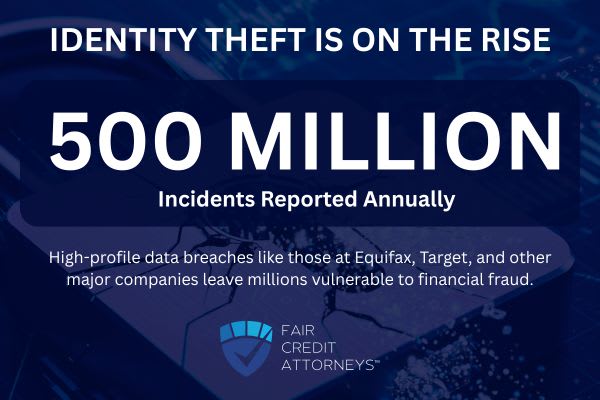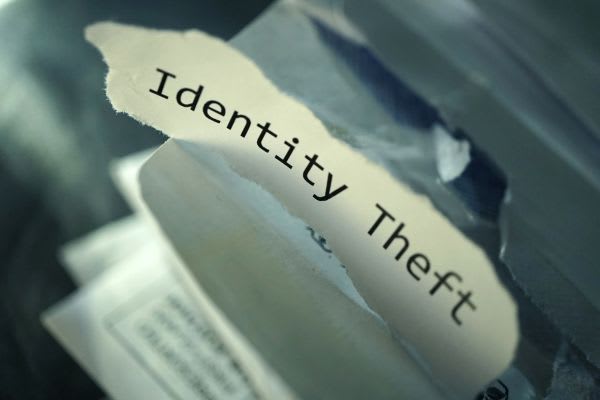Identity theft is a nightmare, and it’s something our firm sees far too often. It happens when someone snatches your personal information, like your Social Security number, driver’s license information, or bank account details, and uses it without your permission.
This is a growing problem in the United States, with devastating fallout that can impact your finances, reputation, and even your peace of mind for a long time.
When you’re a victim, it feels like your life has been turned upside down. You’re left dealing with fraudulent charges, a damaged credit record, and the constant worry of what else they might do.
Our firm provides the expertise and tools to help you combat identity theft. We stop the fraud, restore your records, and safeguard your future. Don’t face this challenge alone. Contact us to regain control and recover what you’ve lost.
Understanding Identity Theft
This crime takes many forms. Thieves might steal your credit card numbers, open accounts in your name, or file fake tax returns. They can get your personal information through mail theft, phishing emails, fake websites, or a data breach at a business or hospital. Even something as simple as losing your wallet can lead to serious consequences if it ends up in the wrong hands.
The results can be devastating. Victims may see a sudden drop in their credit score, face relentless collection calls for debts they never owed, or even deal with serious legal trouble if someone uses their name during a crime, potentially requiring a criminal defense.
Clearing your name can take months or years, often involving persistent contact with many different companies, government agencies like the Federal Trade Commission, and financial institutions.
Handling identity theft alone is overwhelming. You’ll spend hours contacting banks, credit bureaus, and agencies, often hitting obstacles. The emotional toll includes stress, frustration, and a sense of violation.

Types of Identity Theft
You know, when we talk about identity theft, most people picture someone just grabbing your wallet or stealing your credit card. And yes, those are definitely forms of it! But the truth is, identity fraud comes in so many different flavors, and some of them are pretty sneaky. It’s not always about direct theft; sometimes it’s about building a fake you.
Let’s break down some of the most common types:
Fraudulent Credit Accounts
This is a really common one. You might be reviewing your credit report and suddenly spot unauthorized credit cards or loans appearing on your report that you absolutely never applied for.
These could be store credit cards, personal loans, or even auto loans taken out in your name. Criminals open these accounts, rack up charges, and then disappear, leaving you on the hook for the debt and the damaged credit.
Inaccurate Personal Information
Sometimes, the signs are more subtle. You might notice incorrect addresses or names linked to your credit history that aren’t yours.
While this might seem minor, it’s often a key indicator that an identity thief is trying to “clean” or alter your personal data to better use your identity. They might be trying to redirect mail, or simply establish a false identity that looks legitimate to lenders.
Unapproved Credit Inquiries
Have you ever seen a dip in your credit score, then checked your report only to find lenders checking your credit without your knowledge? These are called “hard inquiries,” and they happen when a financial institution pulls your credit report because you’ve applied for new credit.
If you see inquiries from companies you’ve never dealt with, it’s a huge warning sign that someone is trying to open accounts in your name. Each unauthorized inquiry can slightly ding your credit score, compounding the problem.
Collection Notices for Unfamiliar Debts
This is one of the most alarming and stressful signs: suddenly receiving debt collection letters for accounts you never opened. Imagine getting calls or mail demanding payment for a credit card, a utility bill, or even medical services that are completely foreign to you.
This means the fraudulent accounts have gone unpaid, been sold to collection agencies, and now they’re coming after you, threatening your financial stability and peace of mind.
Synthetic Identity Theft
This is a particularly sneaky and fast-growing type. Instead of stealing a complete identity, criminals combine real and fake information to create a “synthetic” identity.
For example, they might use a real Social Security number (often a child’s, as it’s unlikely to have a credit history yet) with a fabricated name and date of birth.
This new, “synthetic” identity is then used to open accounts and build a credit history, making it very hard to detect with traditional fraud systems.
Medical Identity Theft
Imagine someone using your information to get medical treatment or prescriptions. That’s medical identity theft, and it can seriously mess up your real medical records.
This could lead to incorrect diagnoses or treatments for you down the line, as your true medical history gets mixed with the fraudster’s.
Criminal Identity Theft
Sadly, sometimes identity theft can even lead to criminal identity theft. This happens when someone commits a crime and uses your identity (your name, driver’s license, etc.) when they get caught.
This leaves you to deal with the legal fallout, potentially facing warrants, court dates, or even a criminal record for something you didn’t do.
The Role of an Identity Theft Lawyer
When your identity is stolen, it feels like everything is spiraling out of control. That’s where an identity theft lawyer steps in. They’re pros at understanding all the tricky state and federal laws, including things like the Fair Credit Reporting Act.
They navigate complex systems to restore your identity and create a tailored legal plan for your unique fraud case.
Key services include:
- Investigating everything: We’ll dig into all that suspicious activity and those unauthorized accounts.
- Dealing with the big guys: We’ll handle talking to banks, lenders, and credit reporting agencies for you. No more endless hold music!
- Fixing your finances: We’ll work to correct those pesky credit report errors and get your financial records cleaned up.
- Taking action: If needed, we’ll file lawsuits or join class actions against whoever is responsible.
- Protecting your future: We’ll give you solid legal advice and strong defense strategies to make sure this doesn’t happen again.
Hiring a lawyer saves you a ton of time and, more importantly, gives you peace of mind. A knowledgeable attorney won’t let any detail slip through the cracks and can even help you pursue civil damages if you’ve suffered losses due to identity fraud.

Steps to Take if You’re a Victim of Identity Theft
If you suspect your identity has been misused, act quickly. Early action can reduce the damage and protect you from additional fraudulent activity. Here’s what to do:
- Contact your bank and credit card companies to lock or close accounts
- Freeze your credit with Equifax, Experian, and TransUnion
- File a report with the FTC and your local police department
- Notify the IRS and Social Security Administration if you believe your tax or government records have been compromised
Consult a qualified attorney immediately. An experienced fraud or defense lawyer can guide you on legal protection, especially if your identity was used in a crime. Delays can worsen the situation.
How Do We Fight Identity Theft
It feels like your world’s been turned upside down, doesn’t it? Fighting back against identity theft can certainly feel like an impossible uphill battle. But here at Fair Credit Attorneys, we want you to know that getting legal help from an attorney is crucial for positive results.
The really good news? You typically won’t face a financial hit just for getting that legal help. Most identity theft cases are handled on a contingency basis, meaning your lawyer only gets paid if they win your case.
This is how our process usually looks:
- Free Consultation & Case Review
Start with a no-obligation consultation, where we’ll review your situation and determine the best legal strategy for your case. - Disputing Credit Report Errors
Once you report identity theft to the credit bureaus and furnishers, they are legally obligated to investigate your claim. We help ensure they follow the law by properly investigating and removing any inaccurate information from your report. - Pursuing Damages Under the FCRA
If the credit bureaus or furnishers fail to correct your report after being notified of the theft, you may have the right to seek compensation. We’ll help you pursue actual, statutory, or punitive damages under the FCRA to hold them accountable for their negligence. - Long-Term Monitoring & Legal Support
Identity theft can have lingering effects. Our team offers ongoing legal support, ensuring that your credit report remains clean and any future issues are promptly addressed.
The timeline for resolving issues can vary, but with professional legal services, most people experience faster and more effective results. This is especially true when facing complex situations such as those requiring a skilled fraud defense attorney or navigating the intricacies of the Identity Theft Protection Act.
It’s also reassuring to have someone advocating for you when dealing with complex or unresponsive institutions.
Conclusion
You might be wondering, ‘So, should I hire a lawyer for identity theft?’ The answer is often a resounding yes. An identity theft lawyer can step in to halt the abuse, help you repair your records, and truly aid your recovery.
And here’s the good news: we believe everyone deserves to know their legal rights, and that’s why we often work on contingency fees, meaning you typically don’t pay us unless we win. You absolutely don’t have to do this alone.
Affected by fraud? Fair Credit Attorneys can assist. Our skilled lawyers offer personalized legal support to restore your identity and protect your credit. Contact us for a free consultation.
